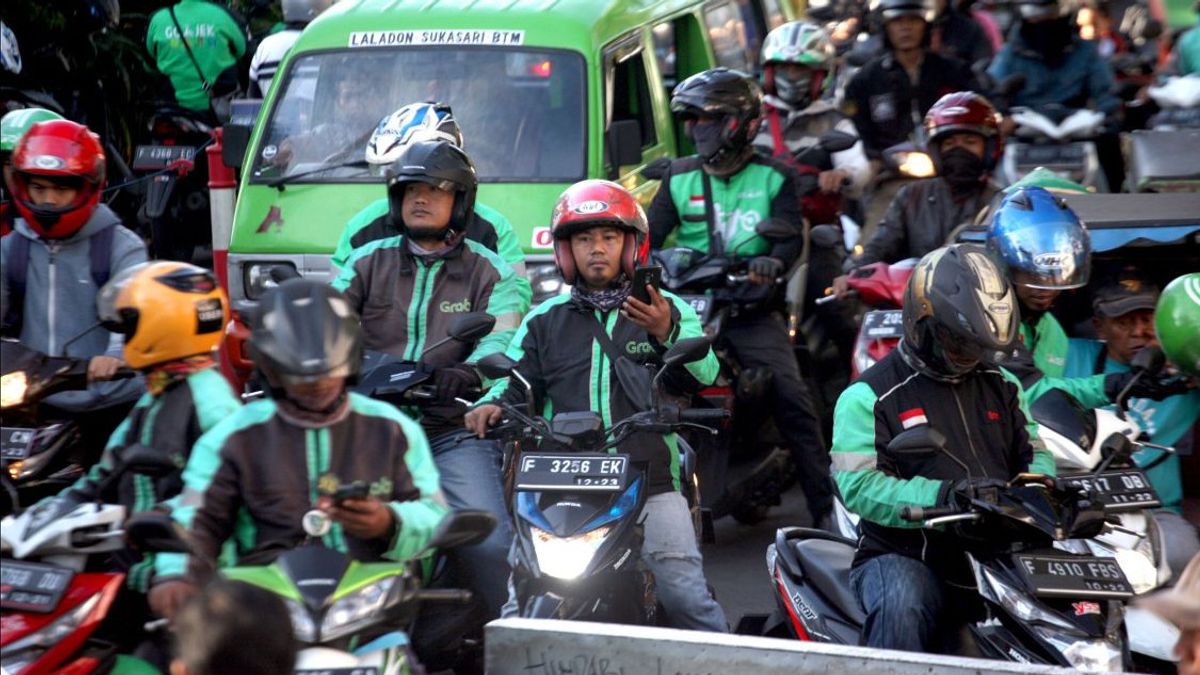JAKARTA - The government is asked to be careful in making policies related to online motorcycle taxis (ojol) so that the industry can develop and continue to make positive contributions.
Moreover, ojol is currently very helpful for the government in absorbing labor and driving the economy.
"The government needs to thank this industry for contributing greatly to GDP (gross domestic product). Therefore, there needs to be special regulations. However, it must be carefully regulated because we have to keep the industry growing," said Deputy Chairperson for Manpower in the Indonesian Chamber of Commerce and Industry (Kadin) and also member of the House of Representatives Muhammad Hanif Dharmakiri quoted from a written statement, quoted from Antara, Thursday, October 10.
This was conveyed during a discussion of the focused group discussion (FGD) with the topic "Menavigasi Keberlanjutan Pekerja Gig di Indonesia" organized by Universitas Brawijaya di Jakarta, Rabu 9 Oktober.
To note, gig workers are people who work for a certain period of time or based on projects (on demand).
For this reason, he emphasized that in making regulations, the government should not always take shortcuts by burdening all responsibilities to applicators. Because according to him, the state also needs to be present and contribute to the welfare of ojol.
He said that welfare is the government's obligation, not the company's obligation, so the government must be involved in the actual meaning.
"Starting from access to training, access to social security, and others, if necessary, give subsidies. Formal workers whose social security contributions are borne by the company, then if they are gig workers, who? The government must contribute too, don't just force the platform or workers to pay. If I am asked who is responsible for social security? I said the government because the constitution said that," said Hanif.
Therefore, continued Hanif, the training provided by the government to ojol is not only in driving training, but also in increasing expertise.
"The access is not driving training, but training to be able to advance to class, considered as an entrepreneur so that they can build good business entities," he said.
The same thing was also expressed by Brawijaya University academic Budi Santoso. According to him, based on the recommendations of the International Labor Organization (ILO), ojol relations with companies do show that ojol drivers are not workers.
"The understanding of workers is that the workers are indeed workers consisting of employee and self-employed and our research results show that currently 81 percent of ojol drivers are making online motorcycle taxis the main job so there is a need to increase skills outside of driving to increase the capacity of these gig workers to enter the formal sector or better work," said Budi.
Meanwhile, researcher from the Center of Economic and Law Studies (Celios) Rani Septyarini conveyed the importance of the government providing appropriate regulations for ojol, which will have a major impact not only on ojol driver partners, but also on the welfare of the community at large.
He gave an example of the results of research conducted by Celios which compared the districts that have or have ojol (ride-hailing) and those that do not have ojol. As a result, it shows that districts that have ride-hailing, the unemployment rate is 37 percent lower than districts that do not have ride-hailing.
"The poverty rate in districts that have ride-hailing also fell 18 percent," said Rani.
SEE ALSO:
With the large role of the ojol, said Rani, it is not wrong if the government needs to pay more attention to the industry, including improving the expertise of ojol workers.
"The contribution of ojol workers is very large for the digital economy, more than Rp900 trillion in terms of transactions. However, this is a transitional work, if there is no upskilling, what will happen to them in the next dozen years? We have to think about the right regulations," he said.
Meanwhile, the Coordinating Ministry for Economic Affairs (Kemenko Perekonomian) acknowledged that the contribution of ojol was very large to the economy. Therefore, the Coordinating Ministry for the Economy is currently working on appropriate regulations related to the work relationship between gig workers and applicator companies.
"The challenge of this platform worker must indeed be answered by the regulation of the Minister of Manpower. platform workers are their own entities outside of partners and workers. For this reason, it is necessary to make a regulation by the Ministry of Manpower which involves the Ministry of Transportation and also the Ministry of Communication and Information," said Assistant Deputy for the Ecosystem Harmonization of the Coordinating Ministry for the Economy Nuryani Yunus.
The English, Chinese, Japanese, Arabic, and French versions are automatically generated by the AI. So there may still be inaccuracies in translating, please always see Indonesian as our main language. (system supported by DigitalSiber.id)
















